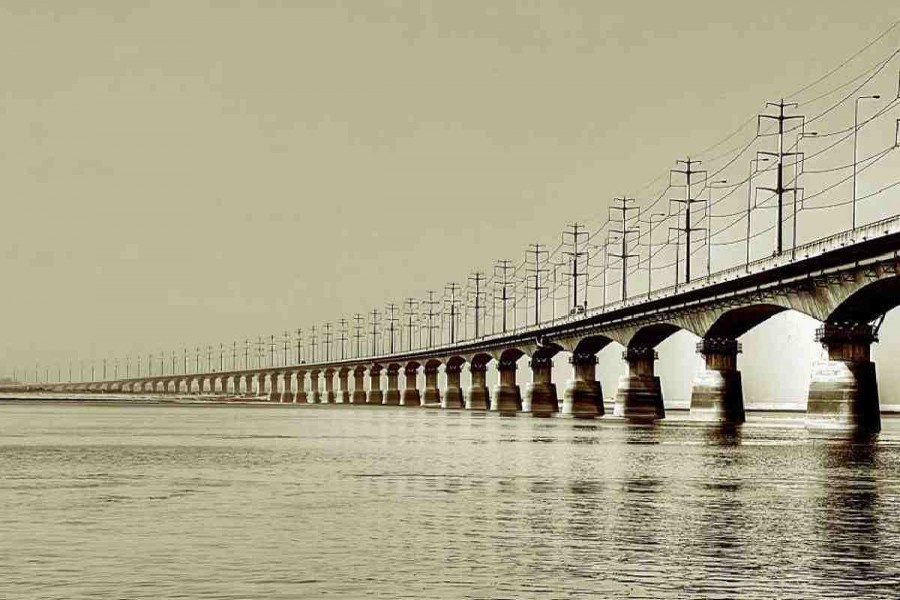Transport users of two major bridges in the country, including Bangabandhu Bridge, will have to pay 11 to 25 per cent higher tolls as the revised rates were announced by the authorities concerned after more than a decade.
The new tolls have also been introduced for goods-laden vehicles against the number of axles (wheels) which were earlier flat for all kinds of goods-carrying vehicles to use the 4.8-kilometre Bangabandhu Multipurpose Bridge and 1.52km Bangladesh-China Friendship Bridge, popularly known as Muktarpur Bridge.
The yearly toll for the trains using Bangabandhu Bridge has been doubled to Tk10 million which was Tk5.0 million.
A circular regarding the toll hike was issued by the Bridges Division under the Ministry of Road Transport and Bridges on Tuesday.
Toll of a motorcycle for the Bangabandhu Bridge will be now Tk50, a car/jeep Tk550, a 32-seat bus Tk 1000, a 5-tonne truck Tk 1000, a truck up to 8 tonnes Tk1,250 and a truck up to 11 tonnes Tk1,600, read the circular.
The new tolls will be applicable for a truck with three axles Tk2,000, a trailer of four axles Tk3,000 but trailers of above four axles will have to pay additional Tk1,000 for an increase of each number of axle.
The current tolls for the Bangabandhu Bridge are Tk40 for a motorcycle; Tk 500 for a car/jeep/microbus and other smaller vehicle; Tk650 for a minibus; Tk900 for a bus; Tk 850 for a smaller truck; Tk 1,100 for a medium truck and Tk1,400 for a big truck.
CNG auto-rickshaws using the Muktarpur Bridge will have to pay Tk30 instead of Tk 20, cars and tempos, jeeps, microbuses, and pickups Tk50 instead of Tk40, minibuses Tk150 instead of Tk 100, 32-seat buses Tk250 instead of Tk 200, 5-tonne mini trucks Tk200 instead of Tk150, 8-tonne trucks Tk 250 in place of Tk 200 and trucks up to 11 tonnes weight Tk 600 instead of Tk500.
New tolls have been introduced for a three-axle truck Tk800, for a four-axle truck Tk1,000 and an additional Tk1,000 for each number of axle increase from above four axles. Toll of motorcycles remains the same at Tk20.
Chief Engineer of Bangladesh Bridge Authority Quazi Mohammad Ferdous told the FE that the revised tolls were introduced following approval of the BBA Board and the Ministry of Finance a few months back.
He said time was taken to make people aware and sensitise about the new rates as no such toll hike has taken place in more than a decade.
According to the documents, tolls for the Bangabandhu Multipurpose Bridge were revised last on September 17, 2011, after its opening in 1997.
Tolls for the Mukterpur Bridge over the Dhaleshwari River have not been rived since it was opened in February 2008.
On June 24, 110th board meeting of the Bangladesh Bridges Authority (BBA) chaired by Road Transport and Bridges Minister Obaidul Quader approved the revised tolls but guided the executing agency to introduce from October.
The board, however, halted the proposal of tolls for the country's much-awaited Padma Multipurpose Bridge.
Construction of the 1.52-km Muktarpur Bridge was completed in February 2008, linking Dhaka with Munshiganj.
On the other hand, the construction of the 4.8-km Bangabandhu Bridge was inaugurated in June 1998, connecting two sides of the river through Tangail and Sirajganj.
Khandoker Golam Moazzem of Center for Policy Dialogue said increasing tolls for the two major bridges has rationality as no such toll revision has taken place in the last 10 and 12 years for the two bridges.
But the Research Director of CDP is worried about making the bridges threatened like roads and highways in the country for allowing overload by goods-laden vehicles and said no maximum allowable axle was mentioned in the toll rates.
"When we see the damage of roads and highways for allowing overloading beyond vehicle capacity, there is also a possibility of damage of the bridges if the limit of maximum axles is not mentioned in the toll rate," Dr Moazzem told the FE over phone.


